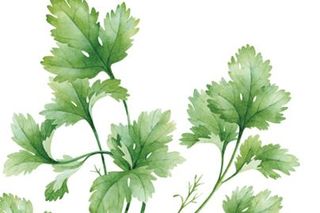
Why Coriander Tastes Like Soap to Some People
They’re not being melodramatic or picky; they have a genetic quirk that makes coriander taste disgusting.

Coriander, that ubiquitous Indian ingredient, is innocuous. It’s always there, like the auntie at every family gathering, who only speaks up when she has something nice to say. Does it add flavor? Sure — but not a profound one. Except for some people, for whom the auntie saves her veiled, backward compliments. For these people, coriander tastes like soap.
Others with a coriander aversion report that the herb smells and tastes rotten to them.
They’re not just being melodramatic or picky — a handful of genetic quirks are the reason why coriander tastes bad for 4% to 14% of the world’s population.
“The message the taste sends to me when I eat it is: ‘This is not supposed to be eaten,'” a friend explains to me as she bypasses a dish with a coriander garnish. “It feels like I’m eating wild leaves plucked out of a bush — it doesn’t feel like food to me. If there’s even one twig of coriander, that’s all I can taste. It’s an extremely powerful sensation, and it’s hard for me to ignore it.”
In a pinch, she can swallow it and fake a smile, if it’s the polite thing to do. But she makes sure it’s not in any dish she orders at restaurants, and “I do not allow it inside my house. My poor parents haven’t had coriander for 25 years because I can’t stand it,” she says.
A single mutation on chromosome 11 of the gene OR6A2 — one of the many genes behind our sense of smell — may be responsible. A 2012 study of more than 14,000 Americans of European ancestry found those with this genetic quirk were especially sensitive to aldehydes, organic compounds with a soapy taste that are, incidentally, an ingredient in soap. Coriander leaves are also high in aldehydes, and odor and taste are highly intertwined.
Related on The Swaddle:
The ‘Bliss Point’ Is How Food Companies Ensure You Can’t Have Just One French Fry
“The sensation of flavor is actually a combination of taste and smell,” Tom Finger, PhD, a professor at the University of Colorado School of Medicine, told LiveScience in 2008. “If you hold your nose and start chewing a jelly bean, taste is limited, but open your nose midway through chewing and then you suddenly recognize apple or watermelon.”
Or, for people with the OR6A2 quirk eating coriander, they’ll taste the soapiness of the plant’s aldehydes, rather than the light herbal tang most people associate with the leaves.
Even if my friend doesn’t associate coriander with soap, the link between smell and taste hits home.
“It’s the smell of coriander — it actually gives me a bit of shudder,” she clarifies. “The smell of raw coriander and then the taste bothers me.”
The genetic trick of fate that makes some people taste soap likely accounts for only a tiny proportion of the number of people who hate coriander, researchers noted at the time; my friend is among the rest whose involuntary shudder over the herb could be linked to variations across a set of three taste genes, one of them associated with bitterness, according to a different 2012 study, this one of twins in the U.S.
Ultimately, scientists seem to agree that some people are just genetically wired to be repulsed by coriander, even if we don’t know precisely which genes are responsible. Perhaps the panoply of genes at play is responsible for a variety in taste, too; for instance, my friend avoids eating other herbs for the same reasons she doesn’t eat coriander — the taste is something of a warning to her.
“Dill is a close second, but it’s nowhere near coriander. I would avoid it, but I don’t have the same reaction. Parsley, again — not a huge fan, but not a vile reaction like with coriander.”
My friend is somewhat unique; South Asians seem to have one of the lowest prevalence of the genetic quirks, according to the Encyclopedia Brittanica. By contrast, among East Asians, nearly one in five people experience a bad taste when eating coriander.
Perhaps because the prevalence of genetically wired coriander-hate is so low among South Asians, the herb flourishes in Indian cuisine. Which is hard on my friend and her taste compatriots.
“It emotionally makes me really sad because sometimes I’ll go to a place, and every dish looks so amazingly yummy — but then is completely ruined by coriander on top of it,” she says with a laugh. “I just feel so disappointed that I’d otherwise have a fantastic meal. It’s hilarious and so extreme.”
Liesl Goecker is The Swaddle's managing editor.
Related


Labeling Fake News Impairs Our Ability to Recognize It: Study
